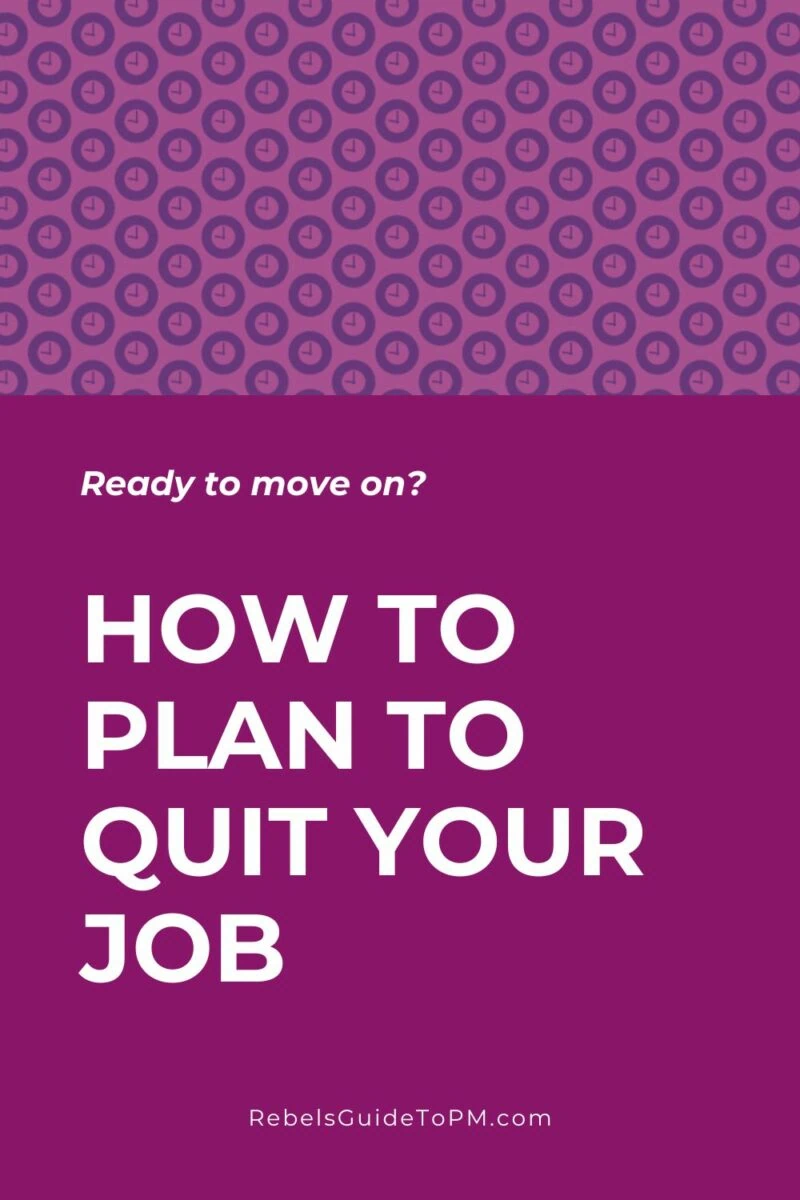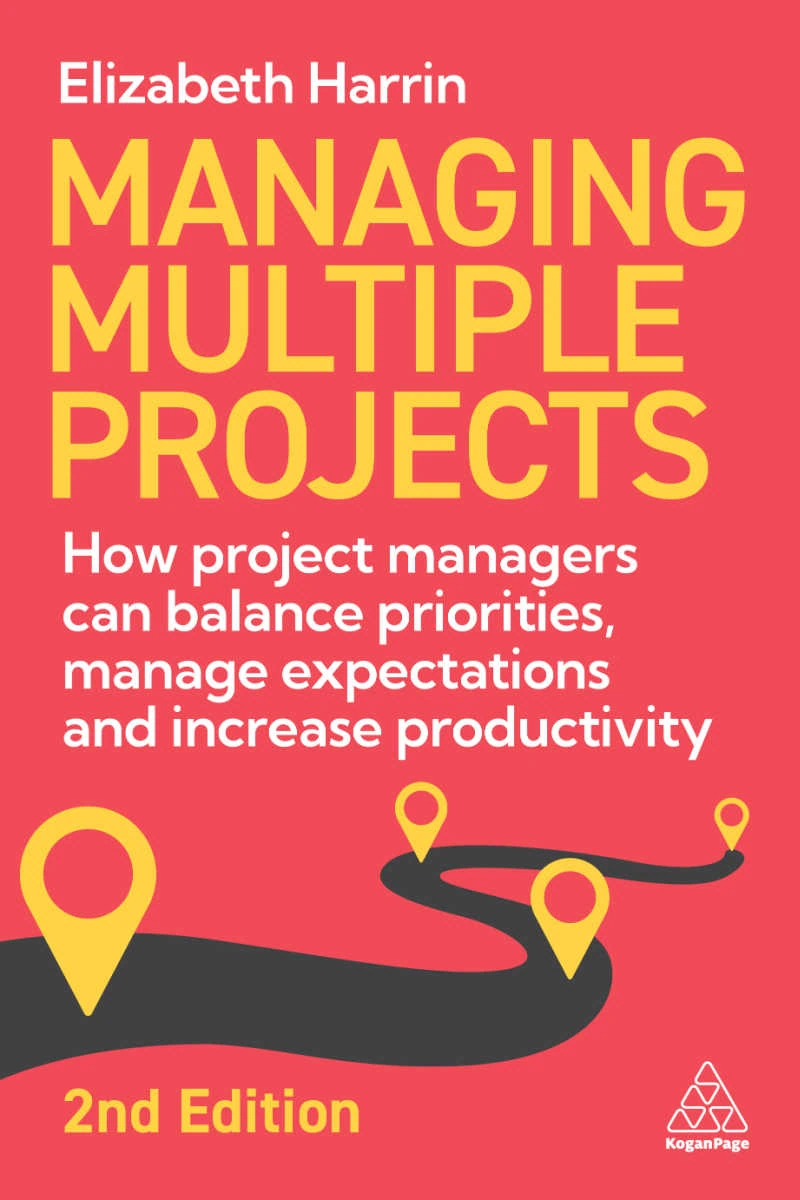How to plan to quit your job
Have you ever thought about how to prepare to leave your job professionally (and gracefully)? What should you do before quitting your job?
Having been in your shoes — not wanting to hand in my resignation until I’m fully prepared to go — I’ve got all the answers for you!
In my case, no one walked me off the premises, but I was prepared to leave that exact day just in case I was put on gardening leave. You never know… especially if your company thinks (or knows) you are going to work for a competitor.
So it’s important to get everything lined up, plan your exit from a job, and then write that resignation letter or email.
I’ve always tried to keep half an eye on the door. Even if you’ve got a great position right now, it might not be a great position in six months.
All kinds of things can change: you get a new manager, someone you don’t like as much. The company downsizes and jobs start to go. Or you take on a new project and it’s not interesting/not challenging/too much to handle/requires more travel than you’re prepared to do.
Career opportunities come up at irregular times, so you might be offered something fab sooner than you were expecting.
All these are valid reasons, and you know what? “Because I want to,” is also a legitimate reason for leaving a role. Life’s too short.

Ready to move on? How to quit your job and not feel bad about it
You might be ready to move on for lots of reasons, and whether your workplace is a horrible place to be or full of your best friends, there is no need to feel bad about your decision to quit your job.
You are moving on, and that’s a good thing, because you have made the decision on your terms.
But you want to go on a high note. You want people to know you tried your best until the last day, and left professionally. So let’s look at how you can prepare to quit and how you can plan your exit strategy.
When everything is in place, you’ll feel confident about surviving and thriving after you leave your current employer.
Even if it seems difficult or time-consuming, it is worth investing the time in preparing a graceful exit.
Being prepared sends a clear message to the people who matter (or it will, when you start telling people) about your level of professionalism. I don’t know about you, but in my industry it’s quite a small world, and I’ve often ended up working with people from companies I have left in the past.
You never know who you are going to bump into again, so you want to keep your decision to yourself until you are ready to go.
Lots of people are looking to leave their job
Don’t worry about looking for a new post — I can guarantee that many of your colleagues are looking too.
With turnover up to 23% in some industries, it’s clear that people are happy to jump ship and move to a different employer if the offer is right. The same survey by Salary.com found that 40% of companies are finding it difficult to attract the right people into posts, so if you have the skills and the experience, go for it!
Don’t ever worry about leaving a role if a new, better one is available. But do put some time into planning your exit so you feel good about it and your colleagues aren’t dumped on.
But what happens when you get a bite? Are you ready to jump ship straight away?
Work backwards from your goal
Your plan to leave your job is a security blanket, even if you don’t need it yet.
Here are some things to do before quitting, and this is what your plan to leave your employer needs to cover:
- Maintaining your CV: update it regularly so you’re ready to send it off (and have a couple of versions)
- Personal branding: have a nice-looking LinkedIn profile and make sure your social media profiles pass scrutiny
- Mentoring your successor: you don’t have to tell them you are leaving
- Reviewing your employment contract: know your rights. I couldn’t remember my notice period until I checked!
- Networking: this will help you get a new role and maintain good relationships with colleagues
- Being clear about your career paths: what exactly are you looking for?
- Keeping up with industry trends: so you can talk knowledgeably at interview.
The best way to start preparing your move is to think backwards from your goal. Once you know that you want to find a new job you can start plotting it from that point, back in small steps (like ‘work out notice’, ‘hand in notice’, ‘go for interviews’, ‘find job opportunities’ etc).
Two things that should be towards the top of the list are training and checking your employment contract.
Before you tell anyone that you are leaving (and perhaps before you finally make the decision yourself) do any training courses, or other development opportunities that you’ve been wanting to do.
Check that you aren’t going to be indentured or have to pay back any training if you take a course before you resign.
First: Check your contract
Your employment contract contains all the details of how you can resign and what you can expect when you do. Even if you don’t have plans to move right now, use your next performance review to check your contract is up to date.
You can be checking now what the restrictions are, like whether you can work for a competitor, as that could impact where you could apply for jobs.
You may find that you hand in your notice and you’re told to leave the building straight away — even if you got on well with your boss. With that in mind, make sure you are ready to go.
A checklist for preparing to leave your job
Leaving your job is a big decision, and not one to take lightly. You should prepare an exit strategy so you can leave your current job easily.
Here’s a checklist of what you should do before quitting your job.
- Delete cookies, web forms, saved passwords and any personal emails from your computer.
- Delete personal contacts and text messages from your phone or BlackBerry.
- Save any personal documents that you need on to a USB stick or email them to your personal account — then delete them. (Personal docs only!!)
- You don’t want to give the impression that you are clearing out your desk, but if you have lots of personal things (shoes, in my case) at work, then start taking a few bits home.
- Check that you have contact details for anyone that you might need to get in touch with.
- Get anything you subscribe to (by email or post) that’s delivered to your professional address redirected.
- Make sure you are up to date with your work — whatever circumstances you leave under you must make it easy for the next person to pick up where you leave off.
Now let the job hunting begin!
What to do with email when leaving a job
These days, most employers have email servers and all your messages will be backed up somewhere.
Redirect any personal newsletters or subscription emails you get (like my wonderful weekly newsletter), so they go to your personal email address.
Unsubscribe from the circular emails you don’t really read.
Delete any emails that you don’t need to keep, but assume that there is a record of those somewhere. You aren’t deleting them to get rid of the evidence, but to make it easier for the person who has access to your inbox in the future to find what they are looking for.
My inbox was full of the original discussions with contractors and vendors and loads of useful stuff, when I left my last role. Someone else might benefit from that.
Having said that, your successor is unlikely to get wide-open access to your old emails. But someone might, and there might be a reason in the future for the IT security team to go through your emails to find something.
The best strategy for email when leaving a job is to save down any useful attachments so people can find them on a network drive later. You could also create a list of contacts for your successor, based on people you email most frequently.
Training up your successor
If you already have someone who is your second-in-command, think about your exit strategy for leaving as if they were going to be picking up your work.
If you don’t have someone you could naturally hand stuff over to, it’s worth spending some time training and developing a colleague so they can fill your shoes when you are gone. That might also ease the guilt of leaving, especially if you love your company and your team!
You might be asked to train someone to do your role before you leave. That will only be the case if the company has identified someone to step into your shoes before your last working day.
In my experience, that didn’t happen, but your company may recruit someone and give you time to do a handover.
Things to do before you leave your job
When the time does come to walk out the door you want to leave on a good note. You should aim to leave positively and professionally, and not just because you want a reference.
Here are some things to make sure you take into consideration after you hand in your resignation letter.
- Hit any deadlines you have left — don’t leave a big pile of work that is running late for someone else to tidy up
- Don’t up and leave (shouting “I quit” and just leaving is the worst possible thing you can do)
- Make sure your files are in order so your replacement can easily find what they need
- Have accurate and clear to do lists for the person picking up your work
- Create documents about what you were doing and what you were planning to do
With the practical things out the way, think about how you are going to transition out of the team culture and not burn any bridges.
- Leave on good terms with co-workers
- Think positively about the company you are leaving and don’t gloat about your new job to people who might be jealous you are going and they are not!
- Give all your new contact details to supervisors (this is something you can choose to do — I didn’t. These days, with LinkedIn, anyone who wants to find me can.)
- Don’t give constructive criticism in your exit interview; state problems in a positive way and leave the interviewer with the impression that you have effective interpersonal skills.
You should be leaving with adequate notice, so there should be time to make sure all these transition activities from your exit strategy happen.
Create a job transition plan
Whether you meet your replacement before you leave, or go without someone being in place, your plan to leave your job should include how you will create a smooth transition and handover your work to someone else.
Make a job transition checklist that covers all the things you do in your current position and how they are done. It should include all the routine regular work for your role like project reporting and so on.
You can also include status updates of the in-flight work you are doing so they know what tasks are still outstanding. Make handover notes for current projects and ongoing projects.
A longer, successful career and a higher profile gives you a bigger network. That’s even more reason to make sure that if you are planning to leave your job you do it well and exit gracefully.

Write your letter of resignation
How do you tell your boss you plan to leave? I had a conversation with my boss about the opportunity for a sabbatical, but ultimately I decided I wanted to leave.
You don’t have to have a conversation with them about it. If you know, you know. Write the letter and hand it in, then you’re done.
Your boss needs your resignation in writing. Keep the letter short, factual and include the date that you will be leaving (based on your understanding of your notice period).
A formal resignation letter can still be sent by email. You don’t need to attach a letter as a PDF or document, just write the letter text itself in the email. It still counts!
A note on notice periods: Contract law varies from country to country, but I don’t think it’s professional to ask to leave before your notice period. Expect to work your notice period, or to take any owed paid holiday in that time.
You want to leave on a positive note, so, if it’s true, end your letter with something like: “It’s been a pleasure to work with such a positive and professional team over the past 3 years, and I wish you and everyone at Your Company the best.”
I personally wouldn’t ask for a letter of recommendation in a resignation letter. These days, I’m not sure who even reads letters of recommendation. Employment law in the UK is quite specific about references, and as an employer I’d rather get references myself than rely on a letter that you might have written (if you were unscrupulous) and printed on headed paper before you left.
But if letters of recommendation are common in your industry, go for it. Personally, I’d rather ask for a LinkedIn recommendation.
Your last day
On your last day, expect to hand back any company property such as a laptop, phone, charging cable, a monitor you had for your home office etc.
Write a nice goodbye email and send it to colleagues. In my experience, it’s best to do this early in the day. I left it to about 4pm to send mine and then by the time I checked later to see if anyone had replied, I’d been deleted from the system and couldn’t get into my email to see!
Of course that was completely the right security protocol for the company to follow as I was no longer an employee, but I’ll never know if anyone tried to email me back!

